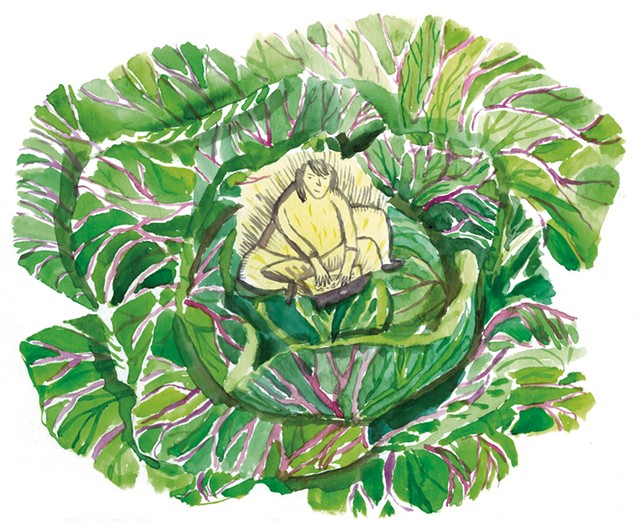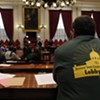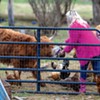Published February 19, 2014 at 4:00 a.m.
Stereotype has it that computer hackers are hermits who wreak dystopian mayhem from the comfort of their dark apartments. Organic farmers, on the other hand, are ruddy-cheeked, Carhartt-clad citizens of the land.
Really, though, the farming and hacking communities aren't such strange bedfellows. That much was clear last weekend, as hundreds of farmers, gardeners, policy makers and students gathered at the University of Vermont for the Northeast Organic Farming Association of Vermont's winter conference.
Just down the hall from those foodies, a group of "civic hackers" — coders and designers who create apps to address societal issues — was meeting. Their challenge? To come up with digital tools to improve Vermont's food production systems.
Organized by the local nonprofit Code for BTV in collaboration with NOFA-VT, the "hackathon" lasted two days. But don't be fooled by the name: Although some actual programming went down, the weekend was more a planning and networking opportunity for its attendees, several of whom were hacker-farmer hybrids — and aware of their exceptionalism as such.
"It's still the beginning, in the early days," said Stan Ward, a food-software consultant who maintains a medicinal farm in the Mad River Valley and participated in the hackathon.
Severine von Tschamer Fleming, a farmer from Essex, New York who helped found the open-source farming guide Farm Hack, put the still-rare existence of farmers who can code this way: "There are some ninjas who can do it," Fleming said, "but it's a barrier to our [farming] community that there aren't more ninjas."
To get the ninja juices flowing, the hackathon facilitators held a workshop for 50-something growers and techies on Saturday morning. Divided into small groups, they were tasked with writing down ideas for new technologies on Post-it notes and placing them on an X-Y diagram that illustrates both usefulness and ease of implementation.
The resulting concepts included mobile apps for tracking crop data, sensors to measure moisture in the soil, programs to locate the nearest farmer's market and — wishful thinking — a GPS tracker for the Heady Topper delivery truck. Although some attendees saw the morning workshop as an interesting exploration, others saw it as a place to test ideas that had already begun to sprout.
Chelsea Bardot Lewis, a coordinator at the state Agency of Agriculture, readily admitted to her table that she'd been "shopping around" her idea for a program that would allow small-scale meat producers to produce trackable data for the weight of each order they fill.
Referring to a poster board, Bardot Lewis presented her idea — tentatively titled What's in Your Locker? — to the whole group. "If you go and pick up your meat from your slaughter facility," she said, "your invoice just has the total weight of meat on it: not super helpful for helping you track your inventory when you get back to your farm." Large processors can afford $50,000 systems to provide trackable information about individual cuts of meat to consumers, Bardot Lewis said, but she'd like to see a much simpler data transfer system
After the morning brainstorm, hackathon participants joined the rest of NOFA-VT attendees for a buffet with offerings ranging from turkey and tofu tikka masala to root slaw and apple crisp.
Unlike some hackathons that challenge participants to generate an app in 24 hours, this one had no such time crunch. The afternoon would be unstructured, explained Code for BTV leader Bradley Holt. "We've found people are good at organically forming teams to work on things."
One team had already formed: Three web developers from Vermont Design Works, a firm that created the online resource Vermont Food Systems Atlas, used the hackathon to produce an application programming interface — or API — that makes Atlas data publicly available to other developers.
While not as fully formed, other projects generated by the hackathon were rooted in similar principles. Dorn Cox, another cofounder of the open-source website Farm Hack, and several others got talking about how they might create a Front Porch Forum-like resource — a "virtual toolshed" — where small groups of farmers could borrow and share equipment, seeds and know-how.
Fletcher Free Library in Burlington lends out basic gardening equipment, pointed out Micah Mutrux, one of the coders in those talks, and there's no need for a digital sharing resource to be much fancier than that.
"It all comes back to the way we use the word 'hack.' It doesn't necessarily have to be high-tech," Mutrux said. "That's just what Farm Hack does: find a solution, show it, use it."
More By This Author
Speaking of...
-

Q&A: Howard Fisher Delivers Meals on Wheels With a Side of Good Cheer
Dec 20, 2023 -

Video: Howard Fisher Delivers Meals on Wheels
Dec 14, 2023 -

Q&A: Alexis Dexter Rescued 57 Shelter Cats During the July Flood
Sep 13, 2023 -

Video: Two Months After the Flood, Alexis Dexter Rebuilds Kitty Korner Café in Barre and Continues to Rescue Cats
Sep 7, 2023 -

Q&A: Eliot Lothrop Found His Dream Restoration Project in a Richmond Barn
Aug 30, 2023 - More »
Comments
Showing 1-1 of 1
Comments are closed.
From 2014-2020, Seven Days allowed readers to comment on all stories posted on our website. While we've appreciated the suggestions and insights, right now Seven Days is prioritizing our core mission — producing high-quality, responsible local journalism — over moderating online debates between readers.
To criticize, correct or praise our reporting, please send us a letter to the editor or send us a tip. We’ll check it out and report the results.
Online comments may return when we have better tech tools for managing them. Thanks for reading.















































